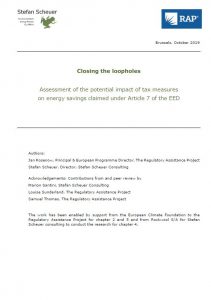Several studies have shown that energy and carbon taxes play an important role in many Member States for meeting their energy savings obligation in the 2014-2020 period. Often, those taxes were introduced decades ago and have not been updated since. Nevertheless, their impacts are claimed to be significant.
A new study conducted by the Regulatory Assistance Project and Stefan Scheuer Consulting assesses the use of taxation in order to meet energy savings obligation (Article 7, Energy Efficiency Directive) over the first four-year period (2014-2017) in all 28 Member States. What would happen if all countries freely credited all energy taxes as energy savings, regardless their real impact? The study concludes that this would render the article 7 meaningless. On paper, it could wipe out the need for any new energy efficiency policy. But on the ground, energy use would continue to increase.
The revised Energy Efficiency Directive contains important safeguards which are set out in the study. Legislators have added new requirements to ensure that tax measures are indeed delivering new and additional energy savings. Applied correctly, this will reinforce the real contribution of the Directive to meet the EU’s 2020 and 2030 energy savings targets.
Authors:
Jan Rosenow, Principal & European Programme Director, The Regulatory Assistance Project
Stefan Scheuer, Director, Stefan Scheuer Consulting
